Ted Cruz Becomes The Target At Trump-Less Debate, Trump Puts On The Donald Trump Show
Without Trump, the seventh Republican debate largely focused on Ted Cruz, who doesn't seem to have done himself any favors. Donald Trump, meanwhile, will likely not pay any price at all for skipping the last pre-Iowa debate.
For most of the day yesterday, right up until the moment the prime time debate started last night, the focus of the discussion leading up to the seventh Republican debate, and the final one before Iowa’s Caucuses on Monday, was Republican front-runner Donald Trump and his decision to skip the debate due to a dispute with Fox News Channel. Even as spectators filed into the arena that Trump’s campaign had rented out for it’s “pro-veterans” event that raised money for veterans without saying exactly where the money would go other than a Trump-controlled Foundation, there was open speculation that Trump would end up going to the debate after all after some dramatic announcement on this part. In its own pre-debate coverage, Fox News Channel even made clear that there was a separate podium ready to be moved onto the stage for Trump “just in case” in changed his mind. In the end, even though Trump said that he’d been having discussions with Fox News representatives all day and that Fox ultimately apologized for the press release that set Trump off on his hissy fit, Trump decided to go to his own even anyway, saying it was too late to change plans. Over at the debate, meanwhile, Donald Trump continued to be a focus of the discussion, but there was also plenty of clashing between the two men closest to him in the polls:
DES MOINES — The Republican presidential candidates competed vigorously to fill the vacuum created by Donald J. Trump’s boycott of Thursday night’s debate, with Senator Ted Cruz of Texas and Senator Marco Rubio of Florida trading ferocious attacks on immigration and taking fire from rivals seeking advantage in the Iowa caucuses on Monday.
Mr. Cruz and Mr. Rubio, who are behind Mr. Trump in the Iowa polls and hoping for surprise finishes here, were repeatedly confronted with pointed questions about their views and Senate votes on providing citizenship or legal status to immigrants who are in the country illegally. But it was Mr. Cruz who was hit hardest on the issue, as Mr. Rubio teamed up with Senator Rand Paul of Kentucky to portray him as an opportunist.
“Everybody’s for amnesty except for Ted Cruz,” Mr. Paul said, turning Mr. Cruz’s favorite shibboleth against him as he denounced the “falseness” that he said Mr. Cruz perpetrated. “That’s an authenticity problem.”
Mr. Rubio was even harsher as he tries to upset Mr. Cruz here and finish in second place, which could strengthen his position against Mr. Trump in the Feb. 9 New Hampshire primary.
“This is the lie that Ted’s campaign is built on,” Mr. Rubio said, seizing on a brutal compilation of video clips that the Fox News debate moderators had shown, highlighting Mr. Cruz’s apparent shifts on immigration.
Mr. Cruz struck back by getting nearly as personal with Mr. Rubio. “I like Marco,” he said, unconvincingly. “He’s very charming. He’s very smooth.” However, Mr. Cruz added, when Mr. Rubio came to the Senate, he backed off his hard-line stance on immigration and supported an overhaul favored by the Republican Party’s “major donors because he thought it was politically advantageous.”
If the debate began on a surreal note, with the candidates poking fun at the absence of the field’s leader, Mr. Trump, it quickly turned conventional as the contenders tried to undercut one another in hopes of gaining favor with Iowa voters.
But the added attention may not have been particularly helpful. There was more time for Mr. Cruz’s image as a consistent conservative to come under relentless attack. There was more time for Mr. Rubio’s past alliance with Democrats on an immigration overhaul to come under scrutiny. There was more time for former Gov. Jeb Bush of Florida and Gov. John Kasich of Ohio to discuss policy, in hopes of helping their chances in New Hampshire, but neither man had particularly electrifying moments.
Gov. Chris Christie of New Jersey, playing the Washington outsider, landed some deft attacks against Hillary Clinton, earning applause for promising that he would never let her “get within 10 miles of the White House.” Mr. Paul, who is so far behind in the polls that he did not qualify for the last prime-time debate, was aggressive and passionate as he made the case for his brand of libertarian politics, explaining that he was opposed to abortion rights but would leave the issue to the states. Ben Carson, the retired neurosurgeon, was almost as faded a presence as Mr. Trump.
Still, the debate gave Iowa voters a chance to see all seven men one last time before the caucuses. With a good share of Republicans still undecided or open to changing candidates, the lack of scene-stealing by Mr. Trump, who held his own rally across town, could pay some dividends for the candidates here or in New Hampshire, where many of them are competing for second place after Mr. Trump.
Mr. Cruz, who ascended in the Republican race in part thanks to his effective debate performances, found himself absorbing the fiercest attacks yet as he looked to regain lost ground in Iowa. While Mr. Trump had often been a punching bag at past debates as moderates and rivals challenged his policy ideas, Mr. Cruz became the main target this time around, facing skeptical questions from the moderators on immigration, ethanol subsidies and his personal style.
His rivals were even more severe, painting him as a holier-than-thou politician. “Ted, you worked for George W. Bush’s campaign; you helped design George W. Bush’s immigration policies,” Mr. Rubio said in a rhetorical torrent. “Then, when you got to the Senate, you did an interview with CBS News — it wasn’t even part of the video — where you said, on the issue of people that are here illegally, we can reach a compromise.”
Mr. Cruz, who ascended in the Republican race in part thanks to his effective debate performances, found himself absorbing the fiercest attacks yet as he looked to regain lost ground in Iowa. While Mr. Trump had often been a punching bag at past debates as moderates and rivals challenged his policy ideas, Mr. Cruz became the main target this time around, facing skeptical questions from the moderators on immigration, ethanol subsidies and his personal style.
His rivals were even more severe, painting him as a holier-than-thou politician. “Ted, you worked for George W. Bush’s campaign; you helped design George W. Bush’s immigration policies,” Mr. Rubio said in a rhetorical torrent. “Then, when you got to the Senate, you did an interview with CBS News — it wasn’t even part of the video — where you said, on the issue of people that are here illegally, we can reach a compromise.”
Yet Mr. Rubio was also a frequent target over his past support for a comprehensive immigration overhaul. Mr. Bush, whose allies have unleashed a multimillion-dollar ad campaign attacking Mr. Rubio over his support for the overhaul, accused him of having “cut and run because it wasn’t popular among conservatives, I guess.”
Mr. Rubio, referring to a book on immigration that Mr. Bush wrote and had just mentioned, quickly returned fire. “That is the book where you changed your position on immigration,” he said, noting that Mr. Bush had moved from supporting a path to citizenship for undocumented immigrants to favoring only a path to legal status.
“So did you,” Mr. Bush responded. “So did you, Marco.”
The Washington Post’s coverage also emphasized the extent to which the absence of Trump, rather than raising the quality of the debate in any real way, simply cause the rest of the field to feel free to target Cruz themselves:
DES MOINES — The first Republican presidential debate without Donald Trump still took on a Trumpian tone at times, with the seven other top candidates here Thursday night voicing anger, talking tough and vowing to do away with political correctness.
But with the defiant GOP front-runner staging his own counter-program by rallying supporters a few miles away, Trump’s absence left a vacuum on the debate stage and fewer fireworks than Republicans had grown accustomed to.
From the opening question, it was mostly filled by Sen. Ted Cruz (Tex.), who has been locked in an intensifying duel with Trump for dominance in Iowa’s first-in-the-nation caucuses, only four days away.
Cruz began by mocking Trump’s reputation for insults: “I’m a ‘maniac’ and everyone on this stage is ‘stupid,’ ‘fat’ and ‘ugly.’ And Ben [Carson], you’re a ‘terrible surgeon.’ Now that we’ve gotten the Donald Trump portion out of the way . . .”
From there, however, little more was said about Trump, few direct attacks were leveled at him and the overall atmosphere was notably calmer than in previous debate. That left Cruz as the top target as Sen. Marco Rubio (Fla.) and other opponents sought to puncture the Texas senator’s appeal by trying to depict him as an inauthentic conservative.
“The truth is, Ted, throughout this campaign you’ve been willing to say or do anything in order to get votes,” Rubio said. “You want to trump Trump on immigration.”
Rubio and Sen. Rand Paul (Ky.) both attacked Cruz for having once supported an amendment that would have granted legal status, not citizenship, to illegal immigrants — though Cruz maintains that it was a “poison pill” and that he has always opposed amnesty.
“He is the king of saying, ‘Oh, you’re for amnesty. Everybody’s for amnesty except for Ted Cruz,’ ” Paul said. “But it’s a falseness, and that’s an authenticity problem.”
(…)
In the absence of Trump, Cruz and Rubio had the most to gain or lose in Thursday night’s debate. The two are the second- and third-polling candidates in Iowa, and their strategies are predicated on being the last non-Trump candidate left standing to face off with the mogul in a long-slog primary season.
Both men emerged with scars.
Rubio appeared to struggle explaining why he advocated a hard-line immigration approach as a Senate candidate, then pursued comprehensive reform that included a path to citizenship for illegal immigrants, then reverted.
Rubio said he does not support “blanket amnesty” and focused on the need to seal the border with Mexico and improve security there.
Former Florida governor Jeb Bush used the exchange to portray Rubio — his onetime protege when Rubio was a Florida state lawmaker — as weak for having reversed positions on immigration. After noting that he supported Rubio’s work in the Gang of Eight, Bush said, “He cut and run because it wasn’t popular among conservatives, I guess.”
“You shouldn’t cut and run,” Bush said. “You should stick with it. That’s exactly what happened. He cut and run, and that’s a tragedy.”
Rubio countered by saying that Bush had reversed his own position on citizenship and legal status in a book he wrote.
“So did you,” Bush snapped back.
New Jersey Gov. Chris Christie used the back-and-forth over Senate votes and amendments to show the leadership differences between legislators and executives, and he repeated his call for a governor in the White House.
“I feel like I need a Washingtonese-English dictionary converter,” Christie joked.
Carson, the retired neurosurgeon who once led the polls but has seen his lead falter among heavy scrutiny of his policy knowhow, invoked his medical career as a credential for the White House: “I’ve had more 2 a.m. phone calls than everybody here put together, making life and death decisions.”
The immigration exchange was one of the few moments of direct confrontation onstage between the candidates. The debate lacked a central focus, with Kelly and her co-moderators, Bret Baier and Chris Wallace, asking many one-off questions that focused on the vulnerabilities of individual candidates.
In return, the candidates gave many of the canned lines that have become familiar on the campaign trail, avoiding taking big risks with the Iowa caucuses so close.
In other words, even without Trump on the stage it was business as usual among the Republican candidates. Indeed, one imagines that had Trump shown up after all things would have largely unfolded exactly the same way that they did, with Trump leading the way on the attacks on Ted Cruz just as he has been since the beginning of January. In some sense, then, the other candidates did Trump’s work for him last night even without him being there by leading the attack on the candidate most likely to challenge Trump’s current lead in the polls in Iowa and, potentially, the only man standing in the way of Trump running the tale in the early state contests that start on Monday. This could not have been an unexpected development for Cruz, of course, given the fact that, in addition to being Trump’s main challenger at the moment, he is also the candidate who stands between the rest of the Republican field and the leader in the race.
Without Trump in the room, this made Cruz the natural focus of the night’s events and by all accounts it did not go over well. For example, Cruz scored points with many Republicans who might not have been supporting him during the CNBC debate in late October when he called out the debate moderators for the questions they were asking the candidates, many of which strayed far from the economic topics the debate was supposed to be focused on. This time, when Cruz did much the same thing it came across as him complaining about the fact that the moderators and the other candidates were asking legitimate questions about Cruz’s own position and the extent to which he has engaged in the same sort of political opportunism on issues such as immigration that he has accused other candidates, and specifically Marco Rubio, of engaging in. If the reactions of many of the conservatives I follow on Twitter are any indication, Cruz did not come across very well at all during these exchanges, and he may well emerge as the biggest loser of the night notwithstanding the fact that his campaign may have hope that the lack of Trump on the stage would have made Cruz appear as more of a natural frontrunner.
As for the rest of the Republican field, Rand Paul and Jeb Bush both appear to have had good nights, which is more than can be said for their previous debate appearances up until now, but for both candidates it may be too little, too late. Chris Christie continued with the pugnacious style that has made him enough of a player in New Hampshire to keep his campaign relevant for at least the next two weeks. Ben Carson and John Kasich, meanwhile, seem to have faded into the background, although that may have been due in no small part to the fact that much of the focus of the night ended up being the all-out assault on Cruz by Bush, Paul, and Rubio. This debate was also notable for likely being the last one with an undercard debate. As I noted yesterday, the next debate on February 6th will be the first to not feature a debate with the lower-polling candidate, so this was likely to be the last time we saw low-polling candidates like Mike Huckabee, Rick Santorum, and Carly Fiorina on the debate stage. It was also notable for being only the second time since the race started that former Virginia Governor Jim Gilmore was allowed on the undercard stage. To his credit, Gilmore seems to have used the opportunity as best he could, even though many people who were watching openly wondered who he was. Unfortunately, to the extent Gilmore may have had an opportunity to make an impression on the voting public, this one debate just four days before the caucuses was probably too little, too late.
Meanwhile, while the other candidates debated, Donald Trump was across town doing his own thing:
DES MOINES — It was supposed to be about the veterans.
It was not really about the veterans.
Donald J. Trump was putting on a show — and it was entirely about him: his hurt, his feelings, his vanity and his revenge.
Separated from the Republican debate here by three miles and enough chutzpah to fill his own auditorium, Mr. Trump taunted, derided and laughed off the candidates who showed up to the Fox News forum that he so theatrically snubbed Thursday evening.
Flying into Des Moines in his gold and leather-lined 757, he held his own one-sided debate, before an adoring crowd of 700, and mused about how his lesser opponents across town were coping with his absence.
Of Jeb Bush, he teased: “He’s probably looking for me.” Pretending to be a lost child, he imitated a frightened Mr. Bush. “Has anyone seen Trump? Where is Trump? Where is he?”
He suggested that, right up until and even after the debate began, unnamed Fox News executives were calling him, pleading for him to reconsider his withdrawal. “How about now?” he said, mocking their entreaties and diminishing the event with a single blow. He said that was impractical. “Hasn’t it already started?”
It was a measure of how peculiar this primary season has become that on a night when Mr. Trump abandoned an official, seemingly mandatory, party-sanctioned presidential debate in a fit of pique, he somehow managed to overshadow it from the start.
Whatever stage he is on, it seems, becomes the main stage, in his mind and those of his fans.
“This is where the show is,” said Aaron Haskin, 37, one of hundreds who waited in long lines in the chilly air to hear Mr. Trump. “It’s kind of a thumb to the establishment.”
Mr. Trump and Roger Ailes, the chairman of Fox News, have both been described as master showmen. But Mr. Trump had ingredients that nobody else could dream of, drawing attention and energy away from the last debate before voting starts here on Monday.
Cable news networks offered saturation coverage, treating the arrival of Mr. Trump’s jet into the Des Moines airport with an avidity reserved for heads of state, an irresistible image opposite an empty debate stage. Graphics flashing across the screen documented the precise — but unbridgeable — distance between the two events. TV tickers breathlessly trumpeted his imminent arrival. “Awaiting Trump Event,” they blared.
Inside the hall, Mr. Trump conducted himself like an auctioneer and celebrity emcee. He asked his model wife, Melania, to stand up for all to admire. He ticked off the names of wealthy friends who he said had accepted his invitation to donate huge sums to veterans causes, who he credited with “unbelievable” Trumpian riches and success.
And then he plucked two surprised and sheepish looking Republican candidates for president out of the crowd (they had shown up ostensibly to support the veterans) and commanded them to join him onstage.
“Governor,” he yelled to Mike Huckabee. “Get up for a second. Get up.”
“Rick?” he shouted to former Senator Rick Santorum.
They both obeyed, though appeared a little uncomfortable.
Mr. Santorum gingerly approached the stage and stood off to its left, saying he did not wish to be photographed in front of the large blue-and-white Trump for president sign. “I’m supporting another candidate for president,” he said, dryly.
At every turn, Mr. Trump bragged about how much more compelling his event was than the rumpus unfolding at the same time across town.
“This is like the Academy Awards,” he said, to laughs. “We are told that we have more cameras than they do by quite a lot.”
It was, in other words, classic Donald Trump showmanship, and the networks competing against Fox News Channel for viewership apparently at it all up. While it’s unlikely that the event will end up having having drawn more viewers than the debate itself, as Trump speculated it might, it certainly was as much the focus of the night as the debate, and is garnering as much commentary this morning as the debate. While it was unclear exactly what connection Trump’s event had to “veterans,” and it will be up to some enterprising reporters to determine just how much of the roughly $6,000,000 Trump claims to have raised actually goes to legitimate veterans groups, it’s also clear that it’s unlikely that Trump hurt himself by skipping the debate itself last night and that, if anyone emerged from the whole showdown as something of a loser it was Fox News Channel, which spent much of its pre-game coverage of both the undercard and main debates talking about the fact that Trump wasn’t going to be at the debate and wondering what impact this would have on the debate itself.
Going forward, of course, the main question will be the what impact the somewhat odd events of last night in Des Moines will have on the Iowa Caucuses themselves. Will Iowa voters punish Trump for spurning an appearance at the only Republican debate out of seven to be held in Iowa during this cycle, for example, or will that largely be forgotten? Will the fact that Ted Cruz apparently didn’t come across very well last night cause his numbers to dip even further than they have so far, thus leading to a Trump victory? And, finally, could the combination of a relatively strong debate performance and Cruz’s stumbles benefit Marco Rubio’s campaign sufficiently to give his campaign the credibility it desperately needs if he’s going to succeed going forward? There will be, no doubt, be several polls coming out of Iowa over the next 48 hours that will try to help us predict the answers to those questions, but at this point the best answer to those questions will come from the results of the Iowa Caucuses themselves, and we’ll have to wait until Monday night for those.
Update: James Joyner notes what appears to be a consensus among analysts that Jeb Bush did well last night as well, and that this was his best debate so far. Given the fact that many of Bush’s previous performances have been fair to poor so far, of course, it wouldn’t have taken much for Bush to improve himself. As with several other candidates on the stage, though, the question for Bush is whether this may have been too little, too late.
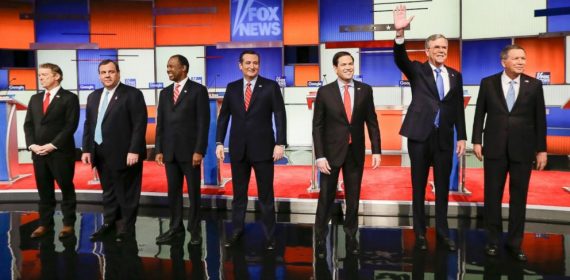

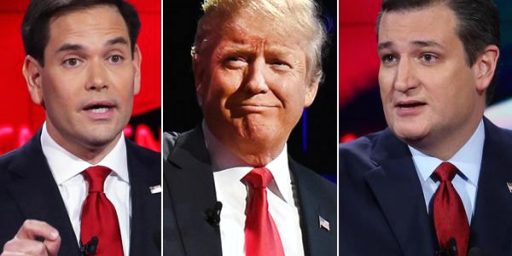
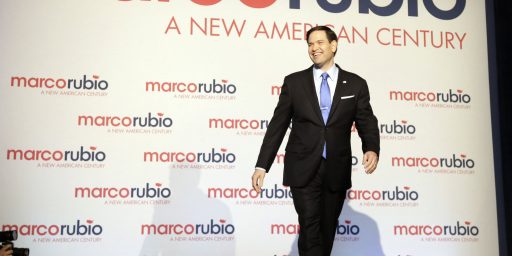
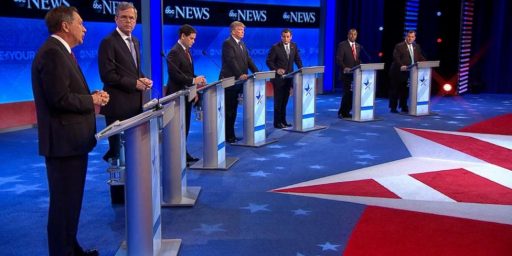
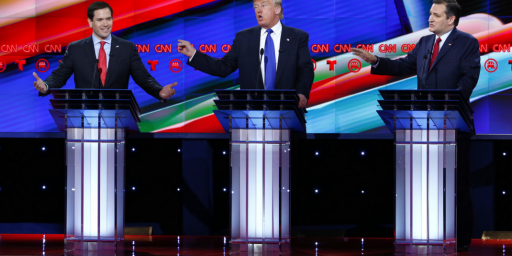
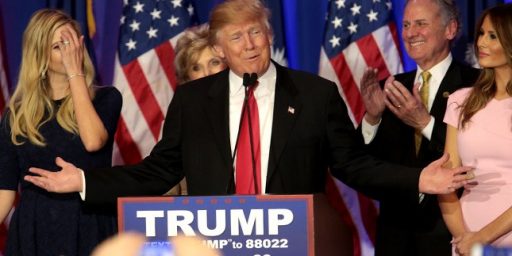
Ok, now that we got the clown show off the stage….what?! You say it’s still there?
Amusing ourselves to death. But what you’ve quoted indicates that the whole Trump surge is indeed a desire to “stick it to the man”, where “the man” in this case is the entire conservo-entertainment complex and the rotating collection of career politicians postulating and taking attitudes.
Not that Trump, with his supposed support of “Wounded Warriors” (already well down the grift maw) is any better. He’s just more obvious: Ok, you want to have a circus barker running the whole thing? Someone who will entertain you and make outrageous statements and keep your eye on him the entire time? That’s exactly what you’ll get!
Fairly sure someone tipped Trump off to Megyn Kelly requisitioning the Daily Show’s video research team for debate questions. Cruz was taken down hard on national television over his immigration talk.
Ted Cruz is a strong advertisement for any organization that fact checks campaign and debate statements
He’s shameless, even by our current low-expectations-oriented campaign and debate standards. He’s still asserting that Obama has caused the loss of millions of jobs, when in fact (no pun intended), since the historically catastrophic 2008 financial crash, Obama has added well over 1 million jobs and the unemployment rate has declined from 10% to 5%.
No matter though, facts are inconsequential to extreme partisans like Ted Cruz and his party.
Last night’s debate was easily the best. Way more substantive. Paul had a great answer on criminal justice reform. And Cruz, without Donald on the stage, was exposed as the *other* deranged narcissist in the race. I can’t help but think this benefits Trump as Cruz was his main rival and came off very badly.
I’d say that makes this time for Rubio but it’s been his time for six months and he’s done precisely squat with it.
@Hal_10000: As I’ve said before, Rubio reminds me of the fresh-faced newbie your boss hires to put over you because he’s so “promising.” And remains “promising”, the entire 20 years he remains there.
Sort of like people who brag about their IQ scores–at some point, you gotta do something with it. (Yet another reason why I consider IQ scores to be so much hooey. )
I just had to post this from Balloon Juice….
The terror of the Republicans….
I wonder how many people in Iowa will be voting for Trump simply because they can’t stand Cruz?
Another bon mot about Cruz from a commentator over at Pierce’s place:
We have been reassured that Mr. Putin and other world leaders have promised to treat a President Trump fairly, that way he won’t be forced to throw a tantrum and walk away from international negotiations.
How the hell did the party of personal responsibility end up here?
@Hal_10000:
I missed that — what did he say?
Trump’s veterans’ event ruled all-media viewership. Trump lovers watched his veterans’ event on the web.The “coverage” on the MSN and CNN was unacceptable.
Trump’s one-man, low-cost, help-the-veterans, “love-fest” had just 48 hours and it didn’t have any TV ads or a large staff to pull everything together, and yet, it was a very good watch and a very professional presentation.
Whilst, FoxNews had a many-weeks, massive, all-network, promotional push for the 7th GOP debate. Fox, itself also had its own every-15min-ads and its usual (silly) push-talk to make its ratings seem like they won the battle.
I watched the Trump event on the web because both MSN and CNN did their usual all-talk silliness instead actually covering the Trump event. Their coverage was just a different version of the typical misrepresentation of what they actual do.